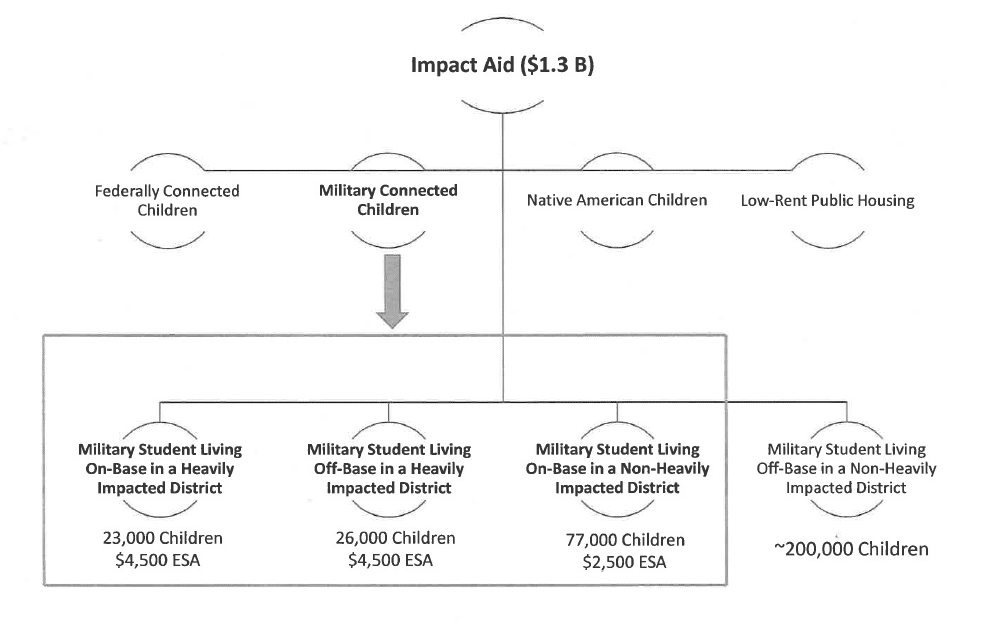
Secretary DeVos, lawmakers: School choice for military families could improve retention
Rep. Jim Banks (R-Ind.) and Education Secretary Betsy DeVos have signed off on a proposal that would give active-duty military families federal funds to put the...
Rep. Jim Banks (R-Ind.) and Education Secretary Betsy DeVos have signed off on a proposal that would give active-duty military families federal funds to put their children through private school or other alternatives to public school.
Banks, a member of the House Armed Services and Veterans Affairs committees, introduced a bill Wednesday that would set up education spending accounts (ESAs) for military families who decide to pull their children out of the K-12 public school system.
Sens. Ben Sasse (R-Neb.) and Tim Scott (R-S.C.) introduced a companion bill the same day.
The bill, modeled after education policy proposals from the Heritage Foundation, a conservative think tank, would give military families access to government funds, known as Federal Impact Aid, set aside for them in the public school system.
Public school districts receive Federal Impact Aid funding to make up for property tax revenue not collected on exempt government property, like military bases and Native American reservations.
Banks, who serves in the Navy Reserve as a supply corps officer and was deployed to Afghanistan from 2014 to 2015, told reporters Friday that a lack of school choice for military families is a major reason why service members choose to leave military service.
“These education savings accounts would provide choices for a very unique population that literally is begging for it,” Banks said at an event sponsored by the Heritage Foundation. “The emotional stories that we’ve already heard since we’ve begun working on the bill, the stories that we’re accumulating of families who say, ‘This is the single reason we’ve been thinking about getting out of the military.’ That’s a profound impact of a piece of legislation like this that would serve.”
Eligible families would receive $2,500 or $4,500 per child annually through their ESAs, based on how many children from military families, as a percentage, are enrolled in the public school districts where they reside. The parents of more than 126,000 children would be eligible to receive ESA payments under the legislation.
According to the Education Department, school districts receiving Federal Impact Aid dollars must, at minimum, have 400 children enrolled and have at least 3 percent of its student body be “federally connected children,” which in this case would be children from military families.

The Heritage Foundation, which has long advocated for school choice policies, says ensuring children in military families receive the education they need could play a major role in service member retention.
According to the 2017 Blue Star Families Lifestyle Survey, 32 percent of service members and 39 percent of military spouses said their children’s education was a major concern they had about life in the military. Both demographics ranked education as one of their top five concerns about military life.
“When you’re deployed abroad, you’re torn between focusing on your job and focusing on making sure that your family is safe and they have everything they need at home,” Banks said.
Lindsey Burke, the director of the Heritage Foundation’s Center for Education Policy, said any improvement in retention through greater school choice would be a major cost savings for the Defense Department.
“If we can save a few percentage points off of that 35-40 percent of folks who have thought about leaving [the military] altogether, that could save a tremendous amount of money for DoD as well. So I think there are some downstream benefits to this, in terms of retention and recruitment,” Burke said.
At the Conservative Political Action Conference in February, DeVos said ESAs would give military families the flexibility they need for their children’s education.
“We know that they’re so mobile generally that it is difficult for those kids, moving from base to base to base, or from city to city to city, to have continuity in their education. An education savings account would afford them a much different dynamic and approach to be able to get their education in the way that best works for them,” DeVos said.
For families that would receive $2,500 annually per child, Burke said the funds probably wouldn’t cover the full cost of tuition at most private schools.
“For so many of these families, they’re already thinking about how they can do an a la carte education for their child. For the families that are eligible for $2,500, my gut instinct is they’ll go the route that looks a lot more like homeschooling. They’ll probably, if they need something other than their district, opt out, hire private tutors, pay for online courses, buy curricula, textbooks, etc.,” she said.
The Military Child Education Coalition found that of the 1.2 million children of active-duty parents, more than 6 percent are home-schooled, nearly twice the rate of non-military families.
“A lot of times, these military families end up in a place where there’s no good option. They turn to homeschooling, and I think that tells the story of why this piece of legislation is so fundamentally important,” Banks said.
Meanwhile, Burke said she’d expect more families receiving $4,500 annually would opt for private school.
“For a lot of middle-income families, which military families would probably fall into that bucket, that’s the difference that they might need to be able to afford it,” she said.
Banks’ bill would have no impact on Department of Defense Dependents Schools (DoDDS).
To be eligible for ESAs, military families must already have their children enrolled in public school. The program would only apply to military families stationed in the U.S.
In a joint statement, several organizations representing military families and public school districts receiving Impact Aid spoke out against the ESA proposal.
“Proposals to divert Impact Aid from schools that educate concentrations of military-connected students are short sighted and will only reduce opportunities for all students in these school districts. We urge Congress to preserve Impact Aid and ensure it is fully funded,” the Military Child Education Coalition, the Military Officers Association of America, National Military Family Association, the National Association of Federally Impacted Schools, and the Military Impacted Schools Association said in a statement.
Copyright © 2024 Federal News Network. All rights reserved. This website is not intended for users located within the European Economic Area.
Jory Heckman is a reporter at Federal News Network covering U.S. Postal Service, IRS, big data and technology issues.
Follow @jheckmanWFED






